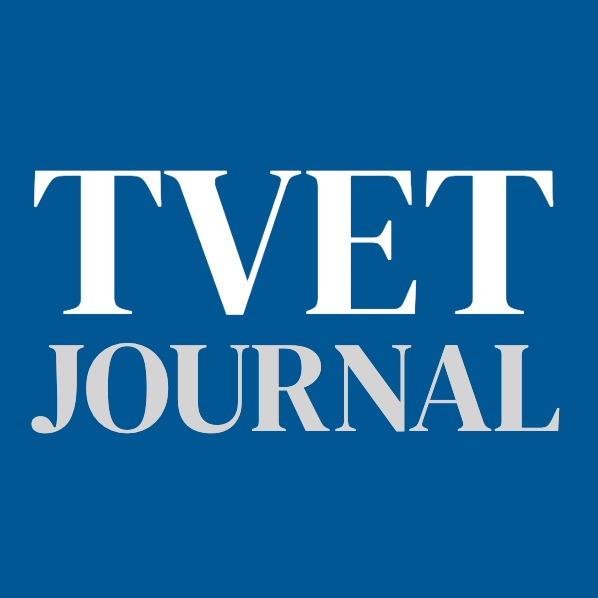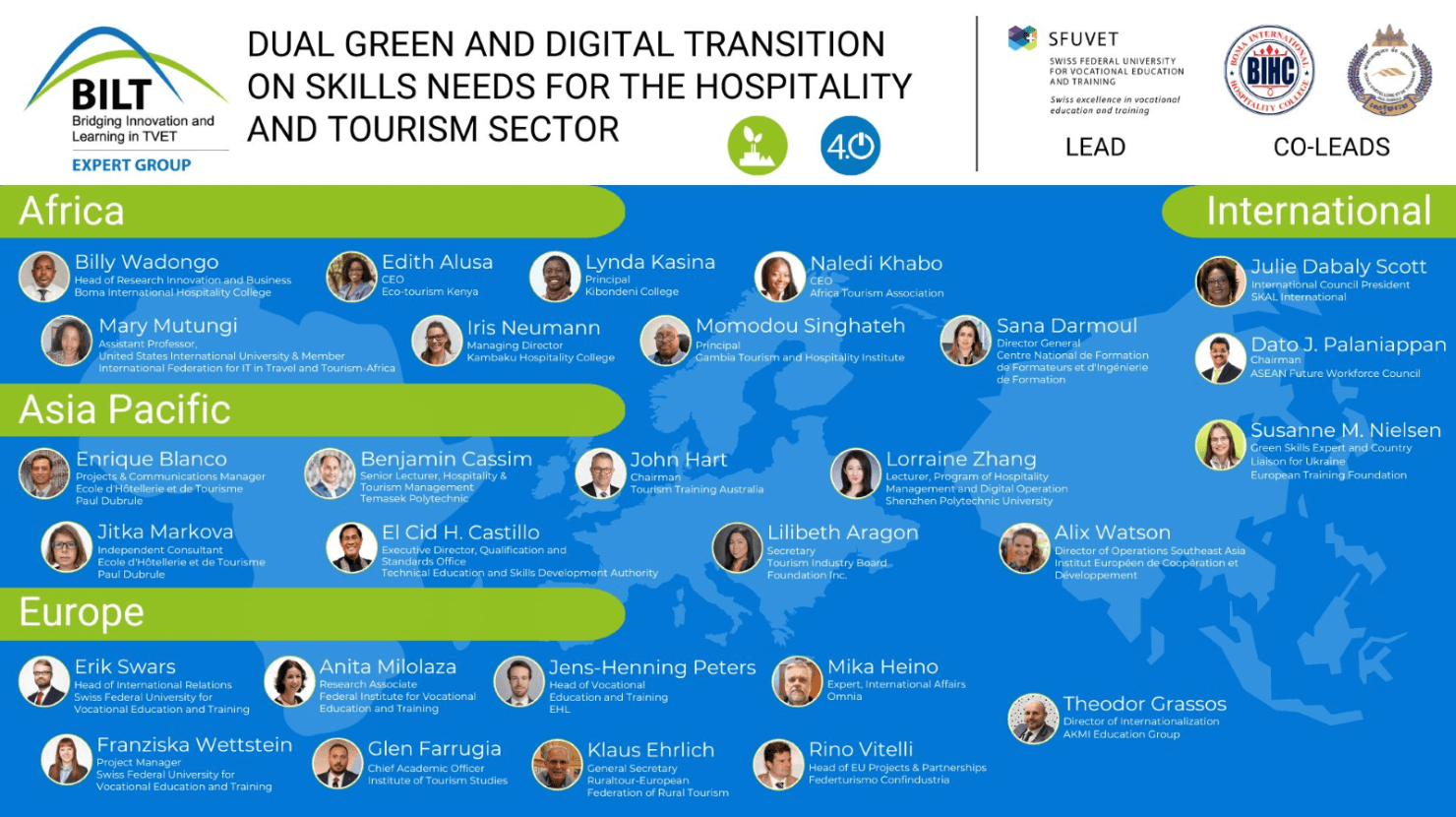Introduction to BILT Project
The Bridging Innovation and Learning in TVET (BILT) project aims to create a global knowledge bridge by offering a peer learning and policy learning platform to address current challenges arising from technological, social, environmental and workplace changes for TVET stakeholders in Africa, Asia-Pacific and Europe.
The BILT project complements national developments to explore and support innovative, society-oriented modes of learning and cooperation in TVET. It is also putting the UNESCO Strategy for TVET 2022-2029 into practice, particularly by facilitating dialogue on the identification of skills required for a just transition to digital and green economies, strengthening partnerships among TVET stakeholders, and expanding the impact of the UNEVOC Network as a leading voice in technical and vocational education and training.
BILT is implemented by UNESCO-UNEVOC with support of the German Federal Institute for Vocational Education and Training (BIBB) and sponsored by the German Federal Ministry of Education and Research (BMBF). It supports the achievement of the United Nations’ 2030 Agenda for Sustainable Development, particularly goals 4 (quality education) and 17 (partnerships for the goals).
The BILT project focuses on:
- Strengthening active partnerships between Africa, Asia-Pacific and Europe through the appointment of international expert groups and the organization of bridging events.
- Developing and disseminating knowledge on emerging innovations and trends in new qualifications and competencies reinforcing learning among TVET institutions, turning reflection into action, and building capacity among the BILT community.
BILT addresses four thematic areas, which are digitalization, greening, entrepreneurship, and migration.
In 2023, the BILT project launched its second expert group to work on the impact of the dual green and digital transition on skills needs for the hospitality and tourism sector and the TVET system. This expert group builds on the findings of the three-volume publication ‘New qualifications and competencies for future-oriented TVET’ developed by the first BILT Expert Group in 2021.

BILT Expert Group 2023
The Expert group 2023 in hospitality and tourism consists of 28 members representing national bodies, international and regional organizations, TVET providers, and NGOs from the project’s regions. It was led by the Swiss Federal University for Vocational Education and Training (SFUVET), Switzerland, which is a UNEVOC Centre, and was co-led by the École d’Hôtellerie et de Tourisme Paul Dubrule (EHT), Cambodia, and Boma International Hospitality College (BIHC), Kenya, representing the three BILT regions.
The Expert Group’s work is distributed across three levels: macro (TVET governance), meso (advocacy) and micro (TVET delivery). Macro level stakeholders can be any number of bodies with a mandate for collective action in TVET. This primarily covers ministries and statutory bodies with legally assigned duties in the governance of TVET.
The meso-level stakeholders indicate institutions participating in the advancement of TVET systems. It includes organizations covering activities in specific economic sectors, such as business membership organizations (BMOs), trade unions, joint organizations or chambers of commerce, industry or crafts.
The micro-level stakeholders are involved in the implementation of TVET skilling programmes and/or their components such as teachers, administrators and programme designers interested in understanding some of the challenges and opportunities of introducing new qualifications and competencies into TVET programmes.
The experts joined six online or hybrid sessions between March and November 2023. Discussions revolved around key trends in the hospitality and tourism sector, challenges, opportunities and recommendations. The members investigated the implications of the green and digital transition in the sector by:
- Taking stock of current debates around new skills in the hospitality and tourism sector within the three regions. This included topics such as the sharing and circular economies, automation, big data and sustainable themes, e.g. food waste, single-plastic use, renewable energies, carbon footprint reduction and certifications.
- Identifying innovative examples of TVET policy and practice in each region looking at the identification of green and digital skills, competencies and new qualifications that are or will soon be in demand in the dynamic hospitality and tourism industry, their integration into in TVET curricula and their implementation in TVET delivery.
- Developing a publication featuring practical recommendations for TVET stakeholders in the hospitality and tourism sector yet to be published in 2024.
Two in-person meetings facilitated networking and cooperation between the members and provided an opportunity to share key milestones of the expert group:
The BILT Bridging Event ‘TVET for Hospitality and Tourism – Solutions for the digital and green transition’ (Singapore, 26-28 June 2023) provided the platform to present preliminary results of the experts’ research and innovative learning practices.
The BILT Learning Forum ‘Striving for excellence – Shaping skills development and strengthening global collaboration in TVET’ (Bonn, Germany, 24-26 October 2023) marked the presentation of the key outcomes of the Expert Group’s collaboration and a hybrid learning lab on the implementation of recognized micro-credentials in TVET in the tourism and hospitality sector in Australia.
Conclusion
The forthcoming publication by the BILT Expert Group 2023 will discuss the interplay of green and digital trends and provide further practical recommendations targeting TVET stakeholders at macro-, meso- and micro-level to deliver future-oriented skills for the hospitality and tourism sector. Scheduled for release during the first quarter of 2024, the publication will give an overview of current green and digital trends in tourism and hospitality as well as TVET and showcase successful practices and innovations from the three focus regions of the project.
In the last official meeting of the BILT Expert Group 2023 held during the BILT Learning Forum, the members discussed future perspectives for their joint work and cooperation. How could they and the BILT project keep benefiting from exchanging ideas and sharing sectoral expertise between the BILT regions? In the future, the expert group could formulate recommendations for the strengthening of green and digital competencies in the informal tourism sector as only the formal TVET systems were considered for the analysis and publication.
Furthermore, developing competency formulations could support curricula adaptation and synergies within the three regions. Finally, the group’s discussions have led to the collection of many good innovative learning practice examples. Further work is required on how they can be adapted to the context of other regions, countries and TVET providers to be successfully transferred and implemented.
A further online meeting in January will provide the opportunity to discuss the details of how to continue members’ interactions in 2024. All experts have been encouraged to join regional exchanges yet to be planned to further formulate recommendations of green and digital skills in TVET systems and discuss the transferability and implementation for successful good practices identified during the expert group work in 2023.
At the same time, during 2024-2025, the third BILT Expert Group will work on the building and construction sector, with a special focus on:
- Greening TVET for the sector;
- Digitalization of TVET delivery; and
- The impact of migration on TVET for the sector.
If you would like to learn more about BILT please refer to the project website: BILT: Bridging Innovation and Learning in TVET (unesco.org)


Great works